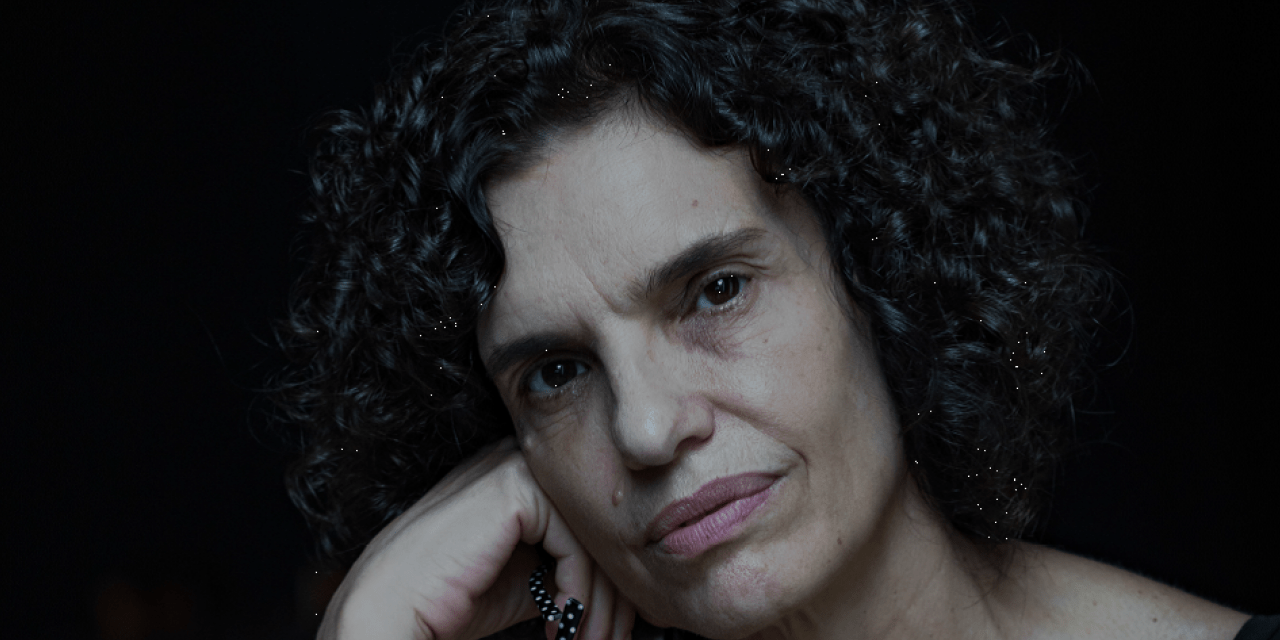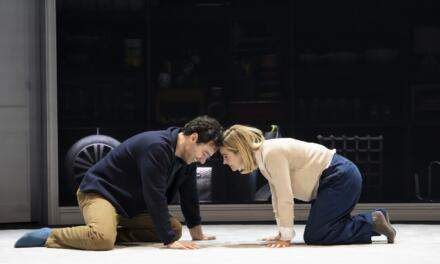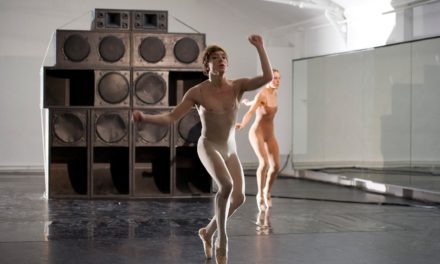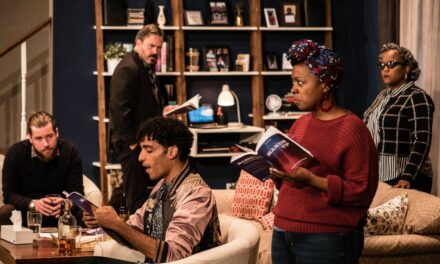Every month, Etcetera gazes into the soul of a performer. Artistic interest instead of human interest. This time, the honor goes to Brazilian choreographer Lia Rodrigues, who works in Maré, one of Rio de Janeiro’s biggest favelas.
What was your first experience with the performing arts?
As a middle-class white girl, I had the privilege of being able to be in contact with arts very early in life which is something that does not happen with the vast majority of children in Brazil. My mother’s sister was an actress in a children’s theatre group and they rehearsed in the basement of my great-grandparents’ house, where I lived. It was around 1963 and I was 7 years old and I loved watching the rehearsals. Then, at the weekend she took me to watch the performances at the theatre and I already liked to stay in the aisle and in the dressing rooms.
What did you want to become as a child?
My father was a journalist and made photos and documentary films traveling all over Brazil. We had a very rich collection of images from the Amazon and other remote places in the country. He wrote about his experiences in the poorest places of Brazil, for example during the great drought that hit the north of the country in the 1960s. He also warned about environmental issues long before this was a concern and created the first newspaper on ecology in the 70/80 Jornal Verde. He explains to me, my brother and sisters about the inequality in our country. He took us to visit and get to know other realities of life. So my first contact with a favela was at the age of 10 and at that time I wrote a small text about this experience. This inspired me to want to be a writer as a child and a little later, in my adolescence, an anthropologist.
Which performance kept you awake at night recently?
The performance on the stage that is called Brazil is what keeps me awake night after night: the deep and dramatic tragedy that we are experiencing in this country. We are living through one of the most terrible moments in our recent history. The covid-19 pandemic exposes the precarious circumstances in which the majority of Brazilians live. We are now more than ever confronted with the profound social inequality and violation of human rights that mark our country’s past and present. Brazil is an extremely racist country, where there is a genocide of black, trans and Indigenous people and an extremely high rate of femicide. The brutal government of our fascist president uses hateful speeches and actions, fake news, violence, and destruction. The government and its supporters disrespect democratic values and promote the destruction of Amazonia, Pantanal, Cerrado, and the killing of the vulnerable groups of the population. They disrespect life. The terrible performance of the genocidal president of Brazil keeps me awake at night.
“The terrible performance of the genocidal president of Brazil keeps me awake at night.”
And which performance is unforgettable?
Many performances are unforgettable for me. I prefer to mention the names of some artists whose works have an impact on me: Antunes Filho, José Celso Martinez Correia , Maguy Marin, Tunga, Amir Hadad, Augusto Boal, Naum Alves de Souza, Cibele Forjaz, Grupo Teatro da Vertigem and Antonio Araújo, Marcio Abreu, Christiane Jatahy, Grace Passo, Dani Lima, João Saldanha, Grupo Galpão, Enrique Diaz, Vera Sala, Aderbal Freire Filho, José Fernando Peixoto , Companhia Deux `a dos, Renata Carvalho, Gabriela Carneiro da Cunha, Volmir Cordeiro, Phia Menard, Calixto Neto, Cristina Moura, Marcela Levi, Ana Pi, among others.
What is your favorite place to be?
The place where I work, the Centro de Artes da Maré in the Favela da Maré, Rio de Janeiro. This territory is an integral part of my work, of my thinking, of my militancy, and I can’t separate it from my process of making art. This is also what makes sense to me politically.
Where would you like to show your work once?
I would like to do a tour all over Brazil. I have traveled a lot in my country but I would like to travel much more to show my work.
Who taught you the most in your life?
My partnership with Redes da Maré in the past 17 years. The NGO Redes da Maré is a civil society organization that, for more than 20 years, has been dedicated to promoting the construction of a network of sustainable development, aimed at the structural transformation of the favela de Maré. Maré, with its 140,000 inhabitants, is one of the largest favelas in Rio and is larger than 80% of Brazilian cities. It is a vibrant place, with a strong tradition of activism and self-organization, rich in popular events and with effervescent commerce. But like all favelas, it suffers from a lack of investment in health, education, security, sanitation, and infrastructure. It is also the place where the civil rights of the inhabitants are disrespected, where the police invade residences and kill as if there were no citizens there. Even though everyday life says ‘No’ to the people who live there, they say ‘Yes’. I learn every day with them ways of creating, organizing, and resistance.
What does your workplace or atelier look like?
My workspace is inside the Art Center of Maré where everything happens at the same time, people coming in and out. A beautiful, organized chaos.
Do you have a ritual before you go on stage or before a premiere?
I don’t have any rituals, I just focus on what needs to be done.
What is the best thing about your job
I have several fronts in my work besides creating a dance piece. On all these fronts there are good things and things that are difficult to deal with. As in life. I also take care of the administrative part of the company, I do the artistic direction of our Escola Livre de Dança, and I help to plan issues of the Centro de Artes da Maré. At this moment, for example, while we are making a new creation, at the same time, workers are changing our roof and installing solar energy as part of our project to make the Art Center a sustainable building. And it also functions as a storage place for food, water bottles, hygiene and cleaning products, and Personal Protective Equipment (PPE) for distribution among 17,000 families in the region who live in extreme poverty. This initiative is part of the ‘Maré says NO to Coronavirus’ campaign. Such a transformation is a beautiful thing: a place for the arts, that has two magnificent stages and that is now filled with food, water. Art, culture, and society intertwine. Civil society has been organizing itself in Brazil, taking over the role that the State is refusing to fulfill. Redes da Maré has done this in a very efficient and beautiful way. This is all part of my daily life. At the favela of Maré, we work with a mix of utopia and pragmatism.
Do your parents like your work?
My mother yes. She went to see my latest creation Fúria at SESC in São Paulo in 2019, at the age of 90, in a wheelchair. My son took her and she watched the show and also stayed for the conversation afterward, even with a lot of discomforts. It was the last time that she could leave the elderly home where she lives. Since March 2020 she has been confined because of the pandemic. My father died more than 20 years ago and he was more concerned with whether it would be possible for me to make a living from my work as a dancer and choreographer.

Furia © Sammy Landweer
Does theatre have an impact?
It depends on which theatre you are talking about, in which part of the world, and who can have access to the performance. Impact on whom, in what, where?
More than ever, South-North dialogue is essential, as the diversity of aesthetic proposals is at the center of all transformations. At a time when all over the world we are building more and more walls and fences, where territories are fiercely demarcated, where borders are imposed and rigorously defended, we need projects that propose to make the opposite movement: investing in possibilities to share and imagine dialogues and exchanges.
I have read that some European artists no longer travel by plane because of ecological concerns. I think this is the right thing to do. You know, these countries from the global North have enormous ecological footprints and everything is needed to make these smaller. The high living standard is out of proportion already for decades. But this choice is also a luxury. They can choose not to fly because they had the opportunity to build their careers in privileged countries. They live in a world that instantly provides them with everything they wish for and they are so used to it that often they don’t realize this. They never suffered from the inequalities resulting from colonialism, one of the biggest causes of the terrible devastations on our planet. So it’s really important that these artists stop using this transport. It is the least they can do, step aside.
But I was extremely shocked that some of them also proposed a boycott of all artists who use air transport. This stance is known as ‘strategic ignorance’: one only wants to know what is convenient, staying outside of the area where the most complex issues are, highlighting their privileged positions. We know that many artists from the global South need to use air transport to show their work in Europe, where the financial resources for the arts are concentrated. The living and survival conditions in their countries of origin are seriously compromised and their societies and economies are still being deregulated by the devastating forces of multinational companies from the North. Proposing a boycott of all those who fly is once again exercising the position of European supremacy that dictates its rules for the functioning of the world. It is the same colonial way of thinking. Not flying does not change the comfortable positions and possibilities of those who enjoy the privileges that the capitalist system offers them, the subsidized elite of European contemporary art. But saying who can or cannot fly shows the authoritarianism that is always present in the North-South relations, preserving inequality and giving the false image that whoever uses the airplane is an enemy of the environment. In the end, reducing your footprint is not an individual question, it is about the collective. And it is not solely an ecological matter, you cannot reduce your footprint without changing politics, economy, consumerism, inequality, and iniquity.
“At a time when all over the world we are building more and more walls and fences, we need projects that propose to make the opposite movement: investing in possibilities to share, and imagine dialogues and exchanges.”
With whom would you like to collaborate once? Are there certain artists you feel related to?
I am always open to collaborations as this is how I work. I feel connected with many artists, not only with those from the dance and theatre world but also with people from other areas such as literature, visual arts, philosophy and social work.
Who would you like to see collaborate on a piece?
I don’t know.
Did you ever have a special encounter with an audience member?
Each audience and each spectator is unique. But I had a special meeting with David Kopenawa, a Yanomami shaman, who watched one of our presentations of For the sky not to fall, inspired by the book written by him and Bruce Albert The falling sky, twice. I would like to share with you what he said: ‘They dance rock, dance tree, dance vine, dance earth. When they look at me, they look at my soul. They look and ask: where are you from? Where do you come from? I come from the Amazon. They represented the cry of the Forest. They entered the soul of the Mountain of the Forest. I already know the dance of civilization. Since I was a little boy, I dream a lot about this dance. Lia’s dance is very strong, to get your attention and shake the heads of the people of the city, for them to wake up and see the forest. So they danced here the art of the trees, the art of the vine, the art of the stone, the art of the river. I felt it because in my village my dream travels a lot and meets this type of dance done with nature. I thought it was very good to draw the attention of the authorities to respect the law of the Federal Constitution. My soul was happy.’
What is the most recent note you made?
This current historical moment shows us how everything is connected, in space and time, and how important international cooperation is. The North needs the South more than ever. In general, it seems that Europe is still reluctant when it comes to non-Western knowledge and still adopts a very masculine and white perspective. We must therefore de-center, widen the center, and make space for other conceptions and world views. The wisdom of the indigenous people has always been the most precious knowledge on earth. We have to listen. Their voices and lives are being exterminated. Let’s finally open the minds and have a radical listening.
Is art your life?
What I do makes me and many other people and projects around me survive. So it occupies a very important part, but it is not my life. It is part of my life.
If you had the chance to start again and choose a new career, what would you do?
I am not busy with starting again, only occupied with going on.
Do you think the theatre will survive in the future?
For me, the problem is surviving in the present, if we succeed we will also survive in the future. If we don’t act now, there will be no future. The future is here and now.
Lia Rodrigues is born in 1956 in São Paulo where she graduated in classical ballet and studied History at the University of São Paulo. She founded the Lia Rodrigues Companhia de Danças in 1990, in Rio de Janeiro. After participating in the contemporary dance movement in São Paulo in the 1970s, she joined the Compagnie Maguy Marin / France between 1980 and 1982. Since 2004, she has been developing artistic and educational projects in the favela of Maré in Rio de Janeiro in partnership with the association Redes da Maré. In 2009, they created the Arts Center of Maré (space for creation, training, and dissemination of arts), and in 2011 the Free School of Dance of Maré. Lia Rodrigues is an associate artist at the Théâtre National de Chaillot and the Théâtre LE CENQUATRE in Paris.
This article was originally published by Etcetera on May 24, 2021, and has been reposted with permission. To read the original article, click here.
This post was written by the author in their personal capacity.The opinions expressed in this article are the author’s own and do not reflect the view of The Theatre Times, their staff or collaborators.
This post was written by Etcetera .
The views expressed here belong to the author and do not necessarily reflect our views and opinions.


















